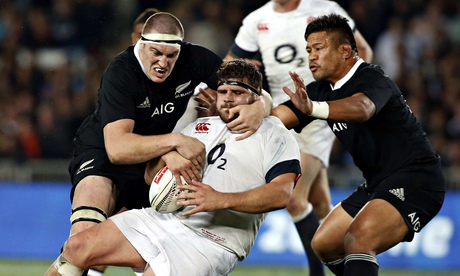
There is a question that comes whenever anybody runs New Zealand close. How bad were the All Blacks? It takes precedence over the matter of how good England happened to be.
How bad? Pretty dire at times, especially at the scrum where David Wilson, Rob Webber and Joe Marler had a day to remember. They scattered the home side so spectacularly that they might stand accused of being too destructive. Just before the hour mark they blasted two scrums and it seemed that no team on earth could build anything from such a retreat.
Steve Hansen, the All Blacks coach, responded by pulling off the humbled 1, 2, 3 on his side. Perhaps he would have done it anyway, 60 minutes being the traditional marker for front-row changes. Whether it was planned or simply a response to the emergency, it worked. New Zealand became rock solid. It will be galling for England that Conrad Smith’s winning try came directly from the set piece where England had made New Zealand look truly exposed and vulnerable.
How bad were New Zealand? Israel Dagg, the silkiest counterattacker in the game, the smoothest runner, had a stinker by his high standards. He misjudged passes and kicks and looked out of sorts. Threadbare cotton, not silk. He too was pulled off, replaced by Beauden Barrett.
The starting full-back was not the only one looking ill at ease. Ma’a Nonu was well contained, slung out a poor pass and kicked the ball out on the full. Perhaps he was distracted by not being shown the yellow card for his pull on James Haskell’s shirt at the start of the game.
How good were England? Even better than their scrummaging was their lineout plus drives. This discipline takes a lot of rehearsal, and for a scratch side to slot into the groove of the set-up and the concerted leg action was a real bonus. Again, Webber, Marler and Wilson played a major part here. Perhaps Wilson will be told to stay with this type of stuff – the pushing and grunting. He did not have his finest day in open play. The handling game …
On the other hand, it might have been an off-day. The second-rows, admirable with their work rate – as ever – had similar experiences, their contribution to the cause interrupted by a failure to secure the ball from restarts. On came Dave Attwood and promptly plucked the first kick that came his way from a restart out of the air and into his chest.
When England had their final restart – after the one and only try – the clock told them they had to give themselves a chance of chasing and securing the ball. They chose Richie McCaw as the target, which may not go down as the selection of the weakest link in the chain. The captain leapt and safely gathered the ball. Restarts are the third set piece and this area was the only one where the All Blacks performed better than England.
Chris Robshaw, for example, was much more creative than McCaw. There was a time when the England captain simply did not do creative at all. As opposed to old Richie who was ever comfortable on the ball. But Robshaw has stretched his vision, as if by physically forcing his eyes wider apart, and has reinvented himself as a deliverer of subtle passes.
McCaw spent almost the entire match on the ground – never a bad place for a No7, but evidence of a concentration on the basics and no chance to add a little glitter.
Ben Morgan had a storming game from No8. New Zealand obviously missed Kieran Read, their master of the slipped pass, but the rivalry between Billy Vunipola and Morgan is pushing the two English 8s into a position from which they will be able to challenge Read’s supremacy. Morgan was outstanding on the charge and made his contributions to the collective effort too.
The worry about Manu Tuilagi is that he needs guidance. He needs to be directed; otherwise he will just charge. Could the inexperienced Kyle Eastmond provide such a mentoring service? They played superbly together, showing polish and never afraid to throw their passes flat and under the noses of Nonu and the best reader of the defensive game, Conrad Smith.
If New Zealand had a clear edge, it was suspected, it would be in the midfield and the back row. The two England centres threw that theory out of the window and Haskell added his weight to the back-row’s outstanding effort.
How did England lose? By losing their power at just the wrong moment – on the hour mark. The Kiwi bench made a big impact. Danny Cipriani was a threat – not that Freddie Burns had been anything but positive as a kicker and even as a tackler – but the authority faded up front. It still counts to seize an opponent by the throat (at it were) and keep him choking to the very end. England’s grip slackened.
In a three-match series it may not matter. There were enough positives here that Stuart Lancaster will feel he can challenge throughout the series. His problem is that the All Blacks made a very ordinary start, but won. How often they do that – scrape through, refuse to yield, push to the very end.
They will grow after this – and fast. There will be a backlash against them. Standards are not allowed to drop for long. The pressure is on and the All Blacks tend to respond well to criticism.
Perhaps England should take a leaf from their opponents’ book and stress that this was not a surprisingly good performance but a wretched example of one that got away, and will not happen again.

